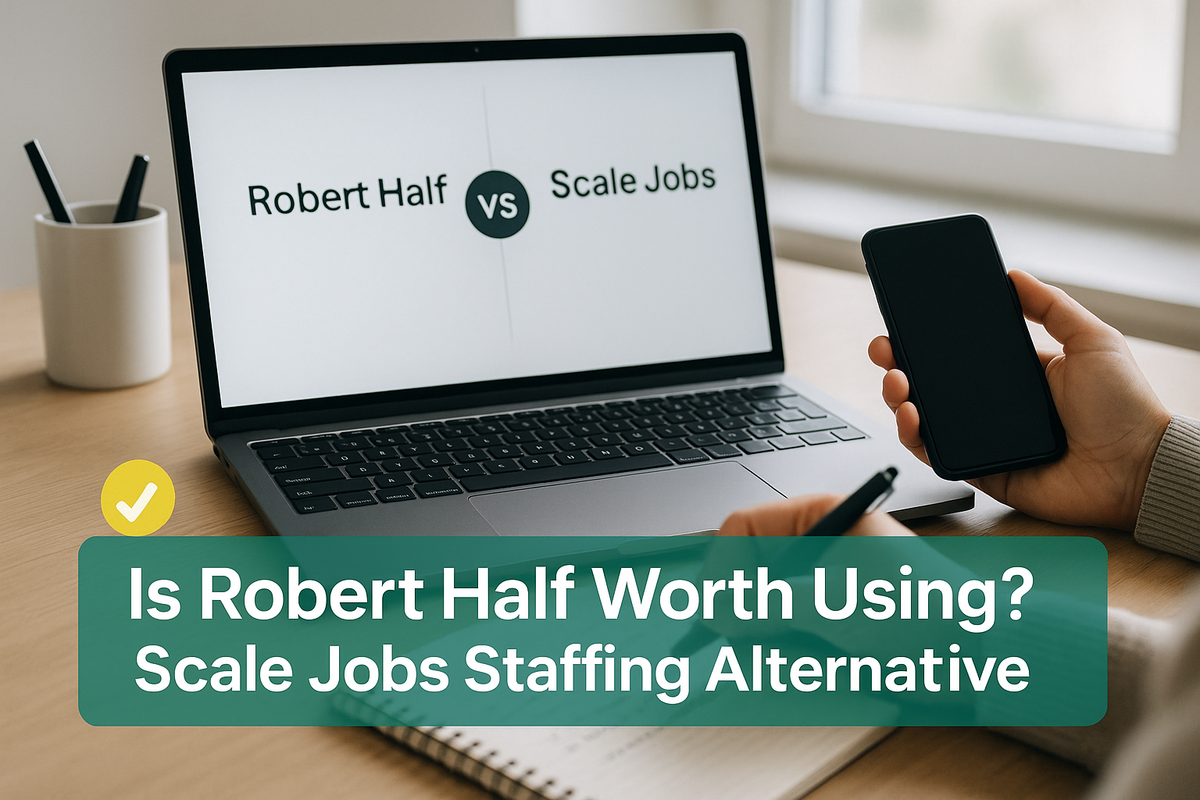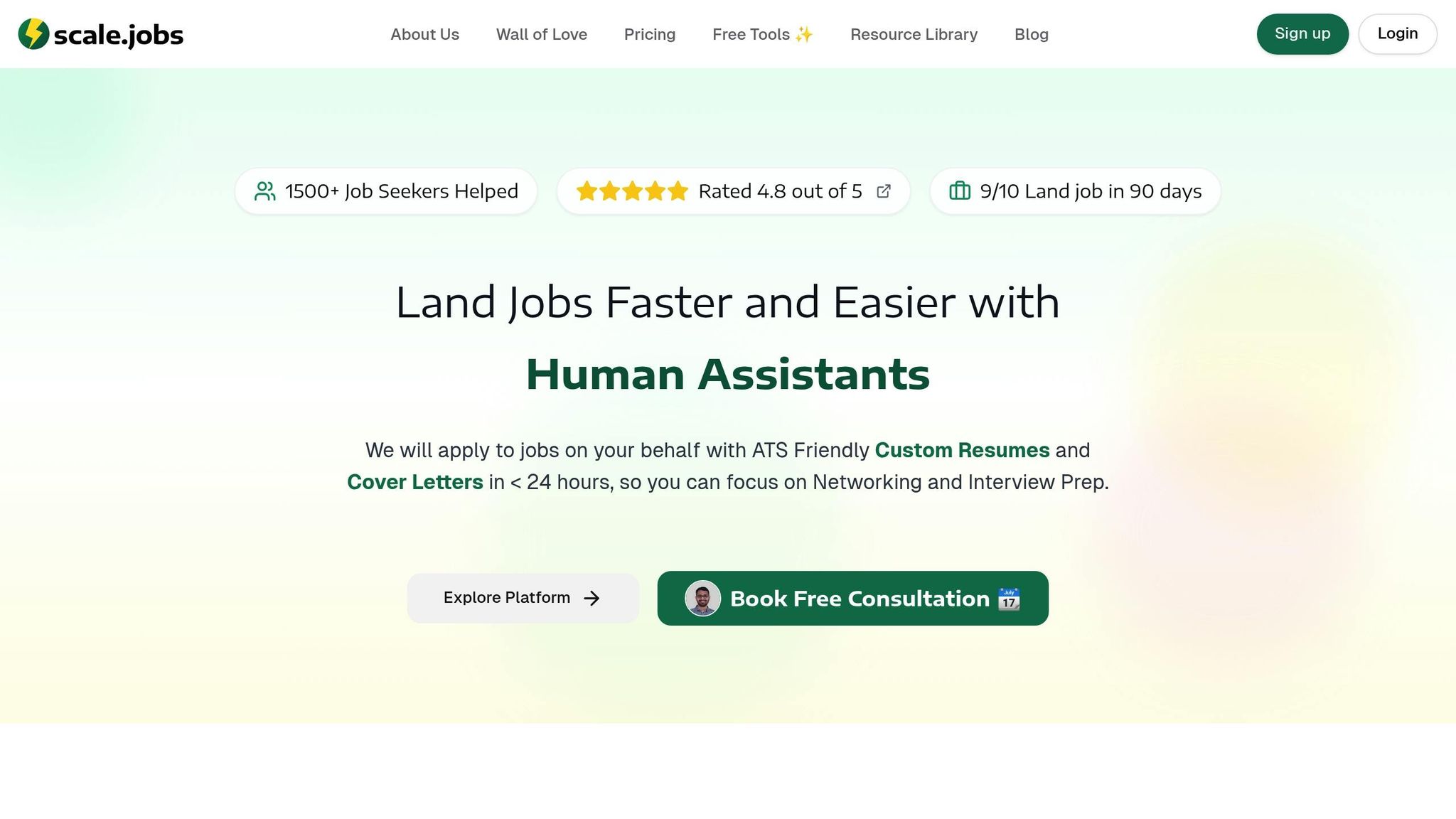Is Robert Half Worth Using? Scale Jobs Staffing Alternative
Explore the differences between traditional staffing agencies and modern job application platforms, highlighting their advantages and limitations.

If you're deciding between Robert Half and scale.jobs for your job search, here's what you need to know upfront:
- Robert Half: A recruiter-led staffing agency connecting candidates to roles in accounting, finance, IT, HR, marketing, and legal. It's free for job seekers but has limited transparency and focuses on specialized industries.
- scale.jobs: A modern platform offering flat-fee, human-assisted job applications. Plans start at $199 and include ATS-optimized resumes, real-time updates via WhatsApp, and a live dashboard. It's ideal for high-volume applications and quick results.
Quick Overview
- Robert Half: Best for experienced professionals in niche fields who want recruiter support.
- scale.jobs: Best for those seeking efficiency, transparency, and control, especially recent grads or career changers.
| Feature | Robert Half | scale.jobs |
|---|---|---|
| Job Matching | Recruiter-led | Candidate-driven with assistance |
| Pricing | Free for candidates | Flat fees ($199–$1,099) |
| Transparency | Limited | Real-time updates, proof-of-work |
| Industries | Specialized fields | Broad range of roles |
| Success Rate | Not disclosed | Claims 90% job offer success rate |
Your choice depends on your career goals and how much control you want over the process.
ROBERT HALF APP REVIEW - IS IT WORTH IT? (EXPLAINED)

1. Robert Half
Robert Half takes a more traditional approach to job placement, focusing on personal interactions with recruiters rather than relying heavily on automated systems.
The Job Matching Process
The process begins with a one-on-one conversation. During this discussion, recruiters assess the candidate's background, strengths, soft skills, and job preferences. Candidates also share whether they are looking for full-time, contract, or temporary roles.
While this approach offers a personalized touch, it may not be as streamlined as the process offered by scale.jobs, which combines transparency with an efficient, human-driven model. Up next, we’ll dive into how scale.jobs sets itself apart.
2. scale.jobs

Scale.jobs takes a fresh approach to job searching, offering direct-pay services that give job seekers complete control over their journey. Instead of following the traditional agency model like Robert Half, scale.jobs emphasizes modern tools and personalized support to meet the needs of today's job market.
The Human-Powered Application Process
At the heart of scale.jobs is its team of trained virtual assistants, who handle every step of the application process. These assistants craft ATS-friendly resumes, write personalized cover letters, and submit applications to any platform - from corporate systems to specialized job boards. With a 24-hour turnaround for each application, candidates can act quickly on new opportunities.
What sets scale.jobs apart is its transparency. Users receive real-time updates through WhatsApp, complete with time-stamped proof-of-work screenshots. A user-friendly dashboard provides a clear view of all applications, replacing the opaque processes typical of traditional staffing agencies.
Here’s how scale.jobs reshapes the job search experience:
- Human-assisted applications with full transparency
- ATS-optimized resumes and cover letters delivered fast
- Flat-fee pricing with measurable results
- Real-time updates via WhatsApp, including proof-of-work
- A streamlined, all-in-one platform for job seekers
Pricing Structure and Results
Scale.jobs uses a straightforward pricing model with one-time payments instead of employer-paid fees. Plans range from $199 for 250 applications to $1,099 for the Ultimate Bundle, which includes 1,000 applications and extra services. According to scale.jobs, 93% of users secure jobs within three months, and 70% receive refunds because they land positions before using all their credits. The platform even claims a 200x return on investment for its users.
All-in-One Job Search Features
Beyond application submissions, scale.jobs offers a comprehensive job search platform. The free version includes access to over 2 million job listings each month, an ATS-compliant resume builder, a job application tracker, and AI tools for customizing resumes and cover letters.
For those seeking more, the AI Assistant Pro upgrade ($9/month at launch, $19/month later) unlocks unlimited AI-generated resumes, cover letters, and interview preparation tools.
Support and Customization
Scale.jobs prioritizes instant communication through dedicated WhatsApp support, moving away from the slower phone call or email-based systems. Additional services like LinkedIn profile makeovers, personal recruiter assignments, and resume reviews are also available, allowing users to tailor their experience to their needs and budget.
Pros and Cons
Building on the detailed process overviews above, this section dives into the main pros and cons of each platform. Both Robert Half and scale.jobs bring distinct advantages and drawbacks, shaped by their unique approaches. Here's what you need to know to make an informed decision.
Robert Half's Strengths and Weaknesses
Robert Half stands out for its expansive network and the expertise of its specialized recruiters. With over 400 offices worldwide, the company excels at uncovering hidden job opportunities and assisting candidates with salary negotiations, particularly for senior positions in fields like accounting, finance, IT, HR, marketing, and legal. Their recruiter-led approach ensures a strong focus on matching candidates to roles that fit both their technical skills and workplace preferences.
However, this model isn't without its downsides. The agency's priorities can sometimes lean more toward meeting its own goals than fully aligning with a candidate’s career aspirations. Additionally, its industry-specific focus limits options for those seeking roles outside these areas.
scale.jobs' Advantages and Limitations
Scale.jobs offers a modern, no-frills approach to job applications with its transparent pricing and human-supported application process. Starting at just $199, their flat-fee model eliminates the uncertainties often associated with traditional staffing methods. According to the platform, it boasts a 90% success rate in securing job offers, making it an attractive option for those looking for efficiency and cost control.
That said, scale.jobs has its limitations. Its emphasis on processing a high volume of applications means it doesn't provide the personalized career guidance or interview preparation that traditional recruiters like Robert Half offer. For candidates seeking one-on-one support or long-term career planning, this approach might feel impersonal.
Key Differences Comparison
| Feature | Robert Half | scale.jobs |
|---|---|---|
| Job Matching | Recruiter-led, personalized matching | Candidate-driven, with assisted applications |
| Support Tools | Career guidance, salary negotiation, interview setup | ATS-optimized documents, tracking dashboard |
| Pricing Model | Employer-paid fees (free for candidates) | Flat fees ranging from $199 to $1,099 |
| Transparency | Limited visibility into the process | Real-time updates and proof-of-work |
| Industry Focus | Specialized in accounting, finance, IT, HR, marketing, legal | Broad range of industries and job types |
| Success Metrics | Not publicly disclosed | Claims 90% job offer success rate |
This comparison table sheds light on the core differences, helping you determine which platform better aligns with your job search priorities.
When Each Platform Works Best
- Robert Half: Ideal for seasoned professionals in specialized industries who value personalized guidance and recruiter-driven support. It's particularly effective for those pursuing senior or niche roles where understanding both technical expertise and workplace culture is critical.
- scale.jobs: Best suited for individuals who need to apply to many positions efficiently without compromising on quality. This platform shines for recent graduates, those impacted by layoffs, or candidates navigating visa-related challenges - anyone who needs a quick, cost-effective way to manage high-volume applications.
Conclusion
Deciding between Robert Half and scale.jobs comes down to your specific career goals and what you value most in a job search platform. Both offer distinct advantages tailored to different needs, so let’s break it down.
Robert Half is all about personalized recruiter support and deep industry knowledge. If you’re a seasoned professional in areas like accounting, finance, IT, HR, marketing, or legal services - and you value one-on-one guidance and help with salary negotiations - this recruiter-driven model might be a great fit. It’s especially appealing for those seeking a hands-on, tailored approach to finding roles in specialized fields.
On the other hand, scale.jobs focuses on efficiency and transparency. With its flat-fee pricing, manual application handling to bypass bot filters, and ATS-optimized documents, it’s a great choice for candidates who want a streamlined process. Real-time updates through WhatsApp also keep you in the loop every step of the way, offering a level of clarity that’s hard to beat.
The key difference lies in how each platform operates. Robert Half’s employer-paid model means you won’t face upfront costs, but you might have less control and visibility during the process. Meanwhile, scale.jobs provides a predictable pricing structure, making it easier to gauge the return on your investment while offering more control over your applications.
If you’re looking to apply to a high volume of roles with top-notch materials, scale.jobs offers a comprehensive solution that blends software, AI, and human support. But if you’re focused on making a strategic move in a specialized industry, Robert Half’s recruiter expertise might better suit your needs.
Ultimately, the right choice depends on where you are in your career, the industry you’re targeting, and how much control you want in the application process.
FAQs
How do Robert Half and scale.jobs compare in terms of job search control and transparency?
Robert Half functions as a traditional staffing agency, primarily matching candidates with job openings. However, it provides limited insight into the application process. This lack of clarity can leave job seekers unsure about their progress or current status, making the experience less straightforward.
On the other hand, scale.jobs takes a more transparent and user-focused approach. It offers tools like human-assisted applications, ATS-optimized resumes, and real-time updates. Features such as proof-of-work and dedicated support ensure users have a clear understanding of their job search progress. This approach allows job seekers to stay informed and actively involved, creating a more engaging and controlled experience compared to the often unclear processes associated with Robert Half.
How much does Scale.jobs cost, and what value can job seekers expect?
Scale.jobs offers a transparent pricing model with a one-time flat fee, starting at $199 for 250 job applications, and additional options like $299 for 500 applications. This setup eliminates the hassle of recurring subscription fees, making it a budget-friendly option for job seekers.
Users have shared that Scale.jobs helps them save a significant amount of time, cutting the average job search from five months down to just one to three months. Beyond time savings, it also opens doors to higher earning potential, with some users seeing salary increases of up to $30,000. By simplifying the job search process and delivering measurable results, Scale.jobs stands out from traditional or subscription-based services.
When would Robert Half be a better choice than scale.jobs for job seekers?
Robert Half could be a great choice for job seekers who appreciate personalized recruiter support and a more traditional staffing approach. If you like the idea of collaborating with a recruiter who invests time in understanding your career goals and connects you with tailored opportunities, this might be the right fit. It’s especially ideal for those who want a hands-on, relationship-focused experience.
In contrast, scale.jobs emphasizes automation, human-assisted applications, and transparent proof-of-work, offering a modern, tech-driven approach to job hunting. Your decision between the two might come down to how much recruiter involvement and personal interaction you prefer versus a more technology-oriented process.




